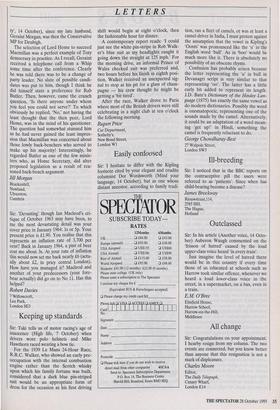Easily confoosed
Sir: I hesitate to differ with the Kipling footnote cited by your elegant and erudite columnist Dot Wordsworth (Mind your language, 14 October), but as one whose distant ancestor, according to family tradi- tion, ran a fleet of camels, or was at least a camel-driver in India, I must protest against the assumption that the vowel in Kipling's `Oonts' was pronounced like the 'u' in the English word 'bull'. As in 'boo' would be much more like it. There is absolutely no possibility of an obscene rhyme.
Confusion has probably arisen because the letter representing the 'u' in bull in Devanagri script is very similar to that representing `oo'. The latter has a little curly bit added to represent its length. J.D. Bate's Dictionary of the Hindee Lan- guage (1875) has exactly the same vowel as do modern dictionaries. Possibly the word is onomatopoeic, representing one of the sounds made by the camel. Alternatively, it could be an adaptation of a word mean- ing 'get up!' in Hindi, something the camel is frequently reluctant to do.
George Chowdharay-Best
27 Walpole Street, London SW3


































































 Previous page
Previous page